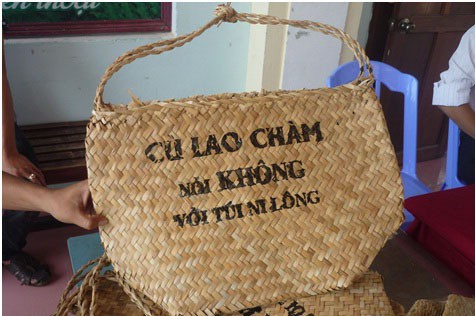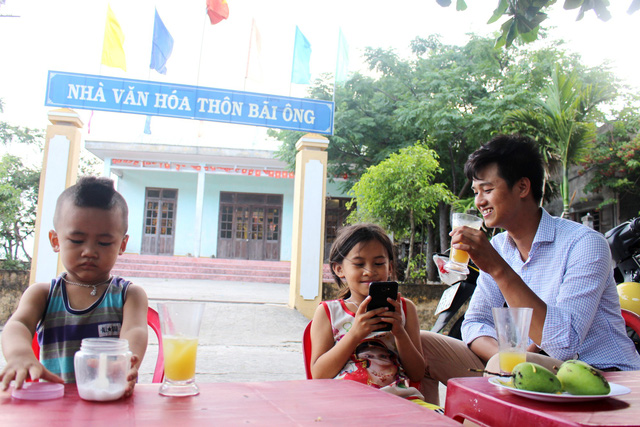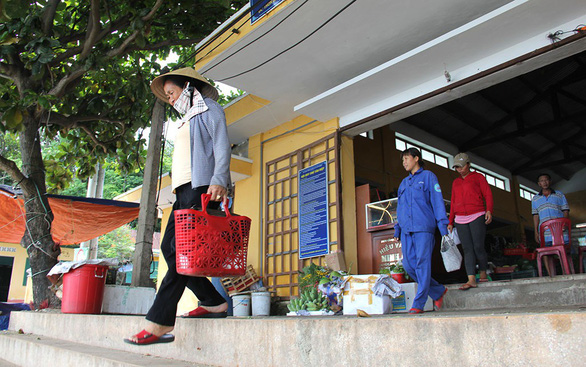Cu Lao Cham, or the Cham Islands, a small archipelago off the coast of the central Vietnamese province of Quang Nam has spent the last ten years eliminating the use of plastic bags and most single-use plastic.
Papyrus bags printed with “Say no to plastic bags” across their fronts are one of the most common gifts foreign visitors to the islands choose to bring home as souvenirs.
This ‘no plastic’ spirit has embedded itself in the daily lives of local residents and steered the islands’ tourism development.
The Cham Islands, a group of eight small islands, lie 20km off Cua Dai beach in Quang Nam’s Hoi An City and are managed as part of the city’s Tan Hiep Commune.
Nothing is impossible!
It has been almost ten years since former Hoi An Party chief Nguyen Su made it his mission to resuce the islands from drowning in a sea of plastic bags.
A surge of foreign and domestic tourists to the Cham Islands can be directly linked to Hoi An’s popularity as one of Vietnam’s must-see tourist destinations. But as tourist numbers increased, so did the amount of trash, particularly plastic bags.
Local incomes began to rise as a result of the tourism, but both local residents and the Hoi An administration knew that a successful tourism economy on the islands was dependent on keeping them pristine.
After some time of adjustment, an agreement was signed to entirely prohibit the use of plastic bags.
Those not in compliance with the regulation face a hefty fine of VND150,000 (US$6.5).
Visitors are also prohibited from bringing plastic bags to the islands.
“Of course it is inconvenient, especially for things with water,” Huong, a local market vendor, said.
“At first, when we sold aquaculture products without plastic bags, it felt as if something was missing, but slowly it became a habit.”
Even though the administration was encouraging and supportive, no one wanted to abandon plastic bags for “stone age” materials, with convenience being the number-one factor in their reluctance.
However, once Tan Hiep authorities began providing villagers with reusable and environmentally friendly shopping bags every two years, “going green” gradually grew on people and became a staple of everyday life.
As Vietnam's laws do not prohibit the use of plastic bags, local authorities on the Cham Islands had to sign an agreement with businesses and residents in order to create an exclusive mechanism to ban the material in order to protect the area, according to the commune’s Party chief Tran Tan Dung.
Dung was also clear in sharing his belief that the model can be applied in other islands and locations such as natural parks and biosphere reserves throughout Vietnam.
 |
| Bags made of biodegradable materials are favored as souvenirs from the Cham Islands. Photo: Tuoi Tre |
A creative environment-friendly lifestyle
Cham islanders have not only stopped using plastic bags but they have also sought out decomposable materials to replace single-use plastics, especially at traditional markets.
Dry goods, for example, are usually wrapped in leaves or papers.
In some cases, villagers also use biodegradable plastic bags to replace the ones tourists bring to the islands.
According to Tran Thi Kim Thuy, a Tan Hiep environmental official, residents on the islands no longer want to use plastic bags out of fear of their environmental impact.
She went on to mention that people are proactively seeking out various alternative materials and an entirely new industry of fashionable bags made from environment-friendly materials is burgeoning.
The island’s residents are also known for saying no to other single-use products such as straws, rice boxes, and cup holders.
Thuy credited the ‘no-plastic-bag Cham Islands’ to persistent efforts made by local authorities, given that using plastic is not an easily changed habit.
Moreover, authorities are also putting a serious effort into ensuring that businesses and visitors are trying to protect the local environment and its surroundings, she added.
“Even though everyone understands the dangers of the plastic bags, they are still aware of their convenience,” Thuy said.
“To change the habit, it is essential that we have alternative materials available.”
As the islands are also a biosphere reserve, the businesses in the region are pressured to be environmentally conscious, according to Thuy.
 |
| Villagers say no to straws and other single-use plastic products. Photo: Tuoi Tre |
The Cham Islands have become a pioneer in promoting a ‘no-plastic’ lifestyle, and many other localities in Vietnam have made similar moves, especially after the Ministry of Natural Resources and Environment encouraged cities and provinces to take part in a nationwide “no plastic waste” movement.
Da Nang, for example, also launched an “Objection to plastic waste” campaign encouraging officials to say no to single-use plastic products.
Other environmentally-concerned activities include waste classification, recycling single-use plastic products, and developing environment-friendly manufacturing processes.
Like us on Facebook or follow us on Twitter to get the latest news about Vietnam!



















































